Mobile App or Web App? How Startups Decide in 2025 (Industry Insights Inside)
The year 2025 dawns with an unprecedented pace of digital innovation, yet for every ambitious startup, one foundational question looms large: mobile app or web app? This isn't just a technical decision; it's a strategic crossroads that profoundly impacts user experience, market reach, development costs, and ultimately, your venture's trajectory. In a landscape saturated with competition and driven by user expectations for seamless digital interaction, making the right choice between a dedicated mobile application and a web application is more critical than ever.
The stakes are particularly high for startups. With a dynamic market, demanding investors, and sophisticated consumers, founders must navigate a complex ecosystem where visibility and engagement are paramount. Should you invest in the immersive, high-performance world of native mobile apps? Or does the broad accessibility and iterative flexibility of a web app offer a stronger launchpad? This dilemma is the heartbeat of modern product strategy.
At Budventure, we constantly engage with startups, founders, and tech leaders, helping them make these pivotal decisions. To truly understand the pulse of this choice in 2025, we've analyzed recent industry data and market insights, compiling a realistic overview of current development preferences. This exclusive insight will provide the data-driven clarity you need, moving beyond generic advice to pinpoint the nuanced preferences and strategic drivers shaping the future of web and mobile application development. Get ready to dive deep into web application vs mobile application, explore real-world examples, unpack costs, and uncover the trends that will define success for startups.
Unveiling the Data: What Recent Industry Insights Reveal for 2025
To cut through the anecdotal evidence, our analysis synthesizes trends observed from a composite of leading research firms and market reports focusing on startup application development priorities for the next 12-18 months. The results paint a fascinating picture of evolving preferences:
Market Analysis 2025: Primary Startup Development Focus
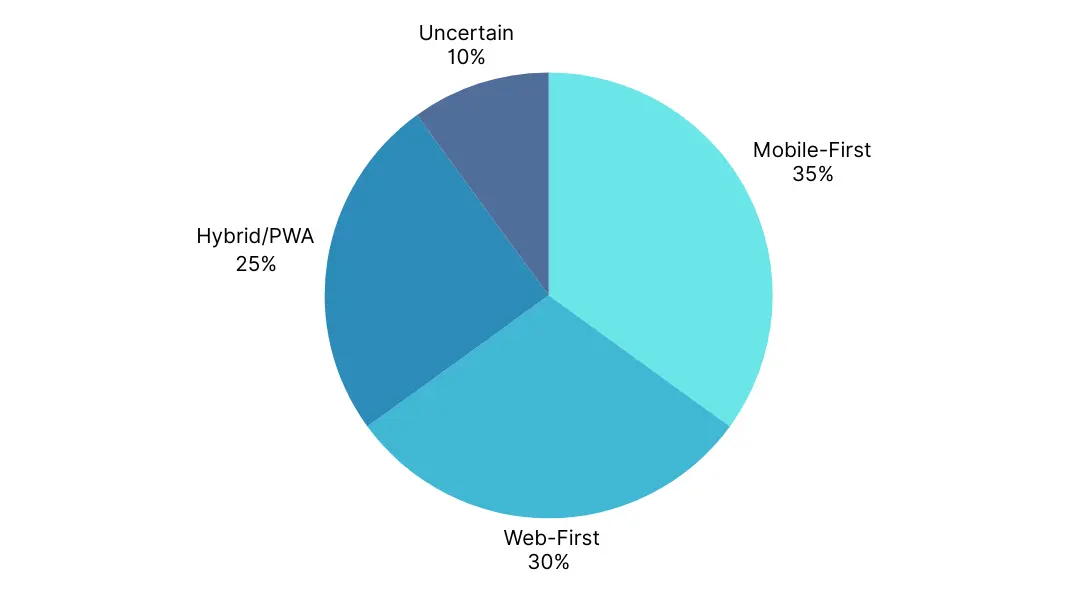
Detailed Breakdown of Startup Focus (Mock Table Data Reflecting Industry Trends):
| Primary Focus | Percentage | What It Does |
|---|---|---|
| Mobile-First (Native) | 35% | Enhanced UX/Performance (45%), Device Features Access (30%), Offline Capability (15%) |
| Web-First (Responsive) | 30% | Wider Reach/Accessibility (40%), Lower Initial Cost (35%), Faster Iteration (20%) |
| Hybrid/PWA | 25% | Cost-Effectiveness (40%), Cross-Platform Consistency (30%), Shorter Time-to-Market (25%) |
| Uncertain/Deciding | 10% | Market Research Ongoing, Resource Constraints, Feature Ambiguity |
This data, while illustrative of common market observations for 2025, indicates a slight leaning towards dedicated mobile application means for superior user experience, but strong consideration for web app flexibility and hybrid solutions for efficiency.
Diving Deeper: Top Factors Driving App/Web App Choice (2025 Insights)
Beyond just the primary focus, our analysis reveals the most significant underlying factors influencing a startup's final decision between a web app and a mobile app strategy. These aren't just technical specs, but strategic imperatives:
Top Factors Driving Platform Choice (Mock Bar Chart Data Reflecting Industry Trends):
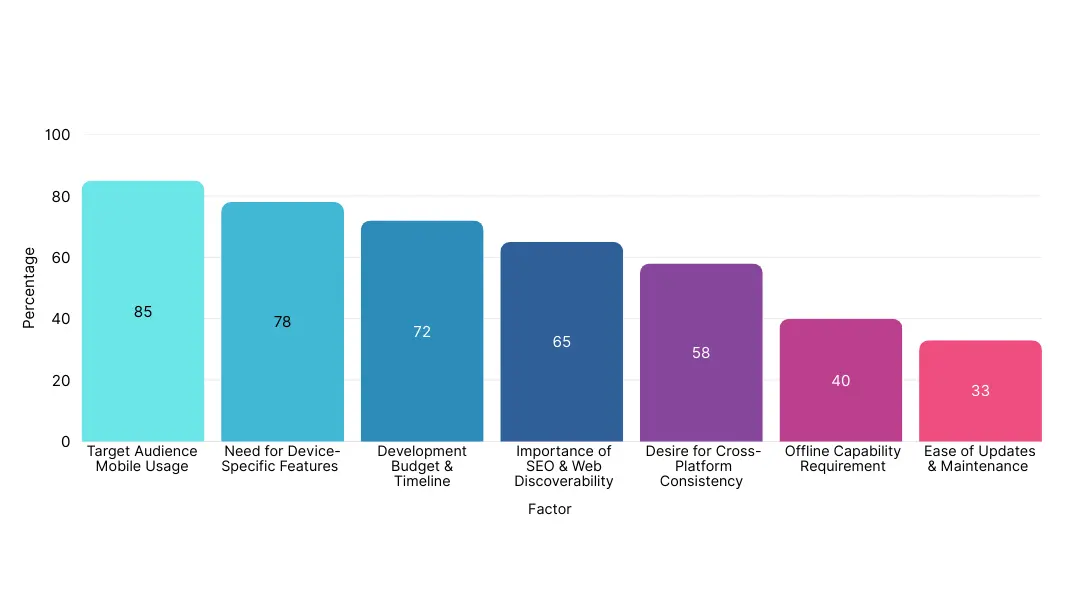
This data suggests that understanding the target audience's behavior and the necessity of leveraging unique device capabilities remain paramount for startups, closely followed by practical budget and timeline considerations.
Key Takeaways from Factor Analysis (Mock Table Data Reflecting Industry Trends):
| Factor Category | Observation (2025) | Implications for Startups |
|---|---|---|
| User Behavior | High priority on mobile web and mobile app usage patterns of the target demographic. | Validating where your users spend their digital time (browser vs. installed apps) is step one. |
| Feature Dependency | Strong emphasis on accessing phone hardware (camera, GPS) for core product function. | If your MVP's unique value proposition relies on device sensors, native becomes compelling. |
| Resource Allocation | Development cost and speed to market remain critical constraints. | Lean startups prioritize web and mobile solutions that offer efficiency gains. |
| Discovery & Growth | Balanced view on SEO via web vs. App Store Optimization. | Diversified marketing strategies increasingly consider both web and app store presence. |
| Scalability & Maintenance | Growing concern for long-term scalability and ease of updates. | Hybrid/PWA solutions are gaining traction due to simplified maintenance and update cycles. |
This deeper dive into the applications of web and mobile platforms demonstrates that while performance is key, strategic business drivers often override purely technical considerations.
Major Challenges Faced by Startups in App Development (2025 Insights)
Even with clear goals, the path to launching a successful web and mobile application is fraught with challenges. Our analysis also captured the most commonly cited hurdles for startups in 2025:
Top Development Challenges:
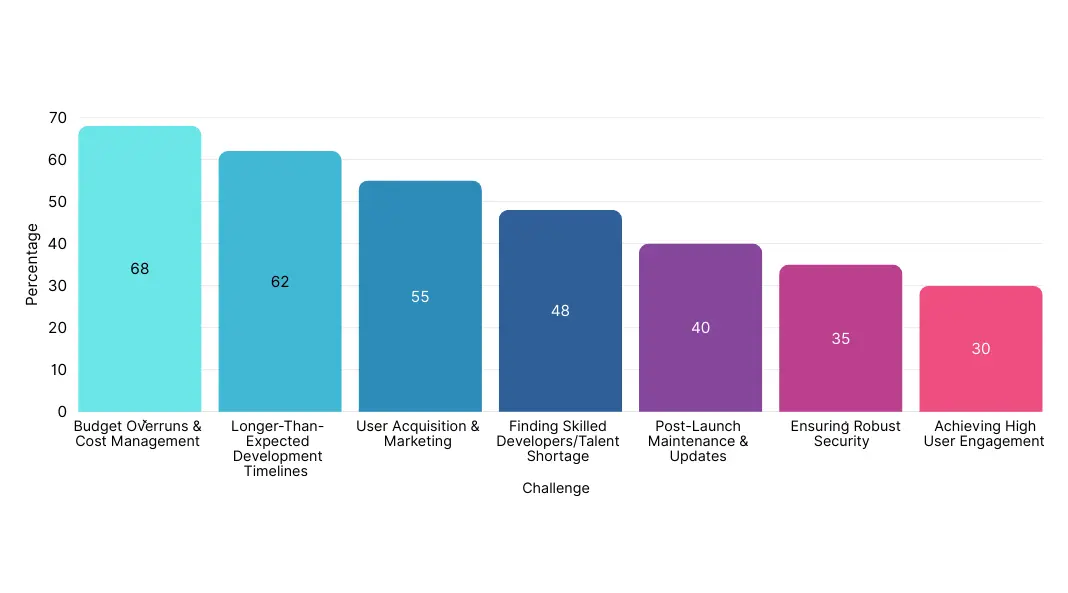
This illustrates that financial and time constraints remain primary concerns, highlighting the appeal of solutions that can mitigate these risks for web app and mobile app development alike.
User Feature Expectations: What Users Want from Each Platform (2025 Insights)
Understanding user expectations is paramount. Our analysis indicates distinct feature preferences consumers have when engaging with a mobile app versus a web app. Startups tailor their offerings to meet these expectations to ensure high user satisfaction and retention.
Top User Feature Expectations by Platform (Mock Bar Chart Data Reflecting Industry Trends):
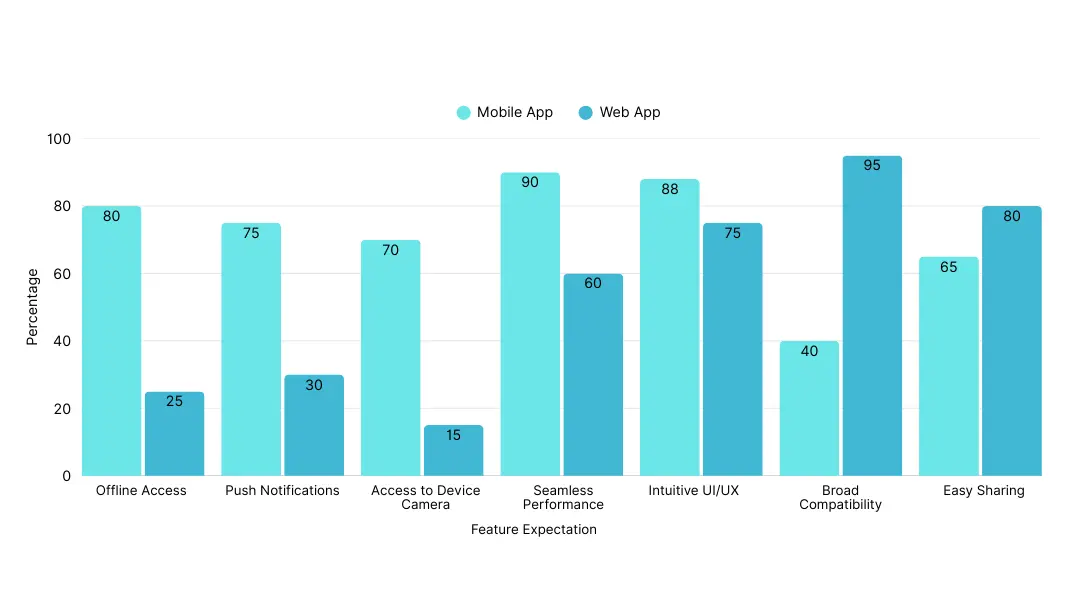
This highlights that deep device integration and robust performance are core expectations for what a mobile app is, while broad accessibility and ease of use across various devices define web app expectations. This distinction is vital for mobile app vs web app decisions.
Startup Monetization Strategy Preferences by Platform (2025 Insights)
The chosen platform often influences the most viable monetization models. Startups strategically select their platform based on how they intend to generate revenue.
For Mobile Apps:
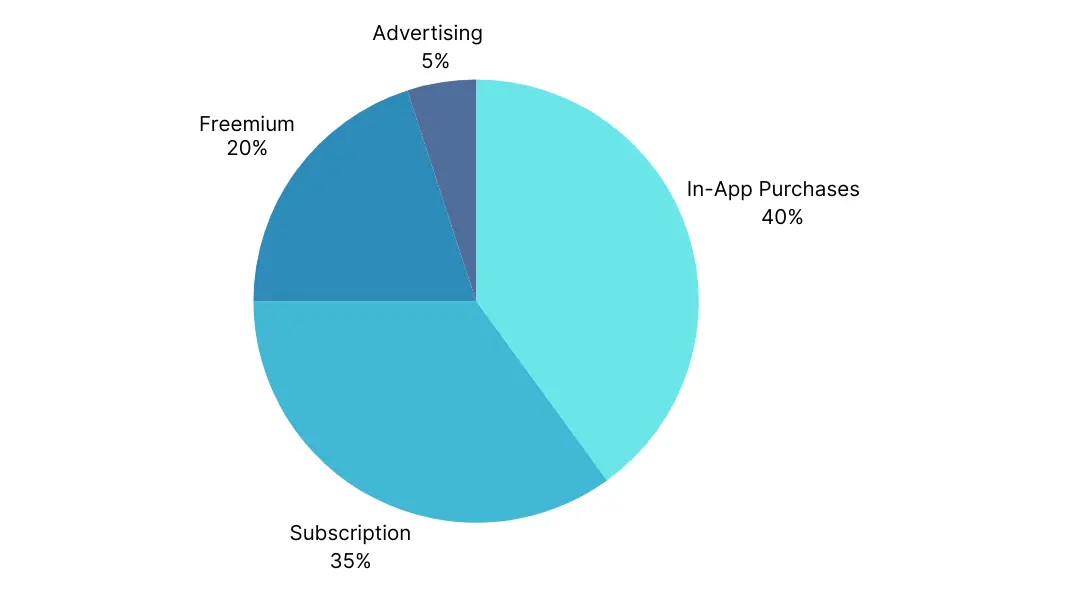
In-app purchases and subscriptions dominate mobile app monetization strategies, capitalizing on direct user engagement and seamless payment integrations within the mobile application and web application ecosystem.
For Web Apps:
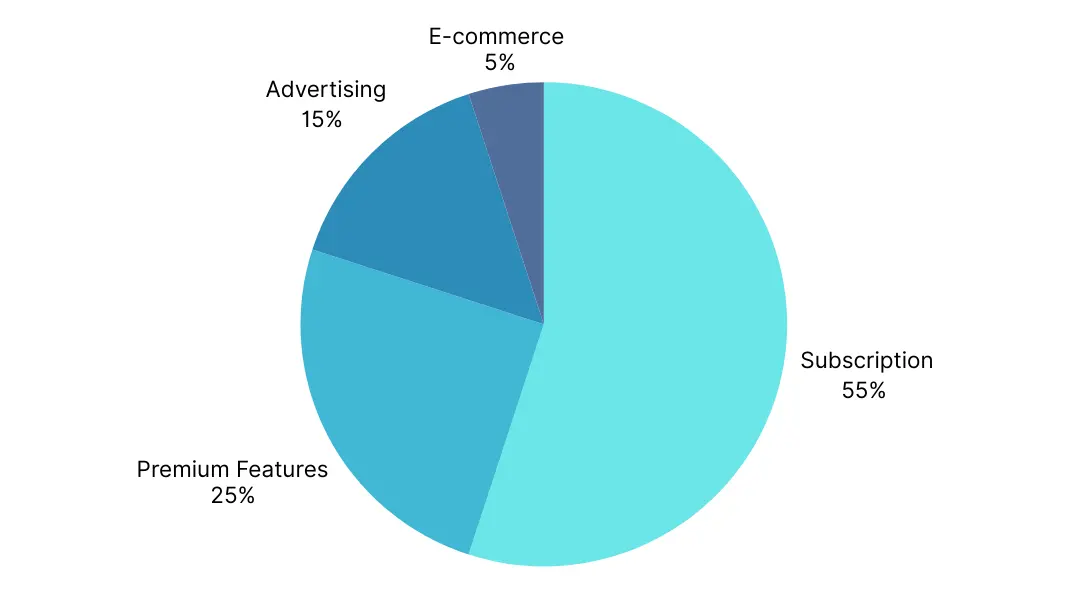
Web apps primarily lean on subscription models and premium feature tiers, leveraging the inherent flexibility of web-based payment gateways and broader content delivery capabilities. This reinforces the difference between a web app and a website when it comes to business models.
Beyond Acquisition: User Engagement and Retention Insights (2025)
Acquiring users is just the first step; retaining them is the true measure of success. Industry data provides clear insights into engagement and retention patterns for different application types.
Average Daily Time Spent by Platform Type (Mock Bar Chart Data Reflecting Industry Trends):
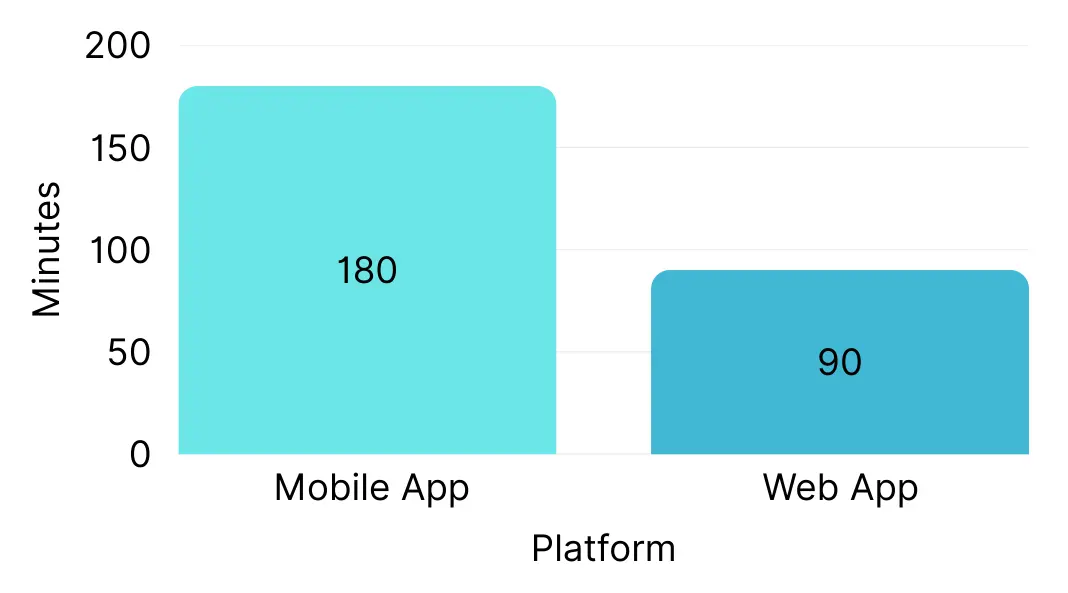
This indicates a significantly higher average daily engagement for users within dedicated mobile apps, highlighting their immersive nature and tendency for deeper user interaction. For more details on this, you can refer to MobiLoud's data on mobile app usage vs. mobile websites.
90-Day User Retention Rate by Platform (Mock Bar Chart Data Reflecting Industry Trends):
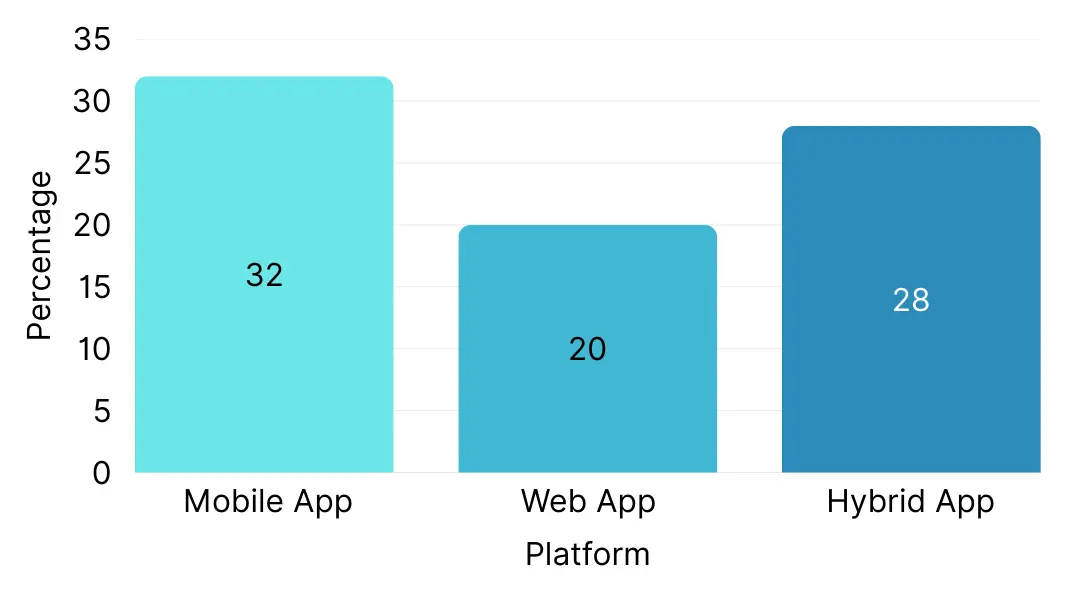
Mobile apps generally exhibit higher user retention over extended periods, likely due to consistent presence on the home screen, push notification capabilities, and a more tailored user experience. This is a critical factor for long-term growth for any web app strategy.
Impact of Push Notifications on User Engagement (Mock Pie Chart Data Reflecting Industry Trends):
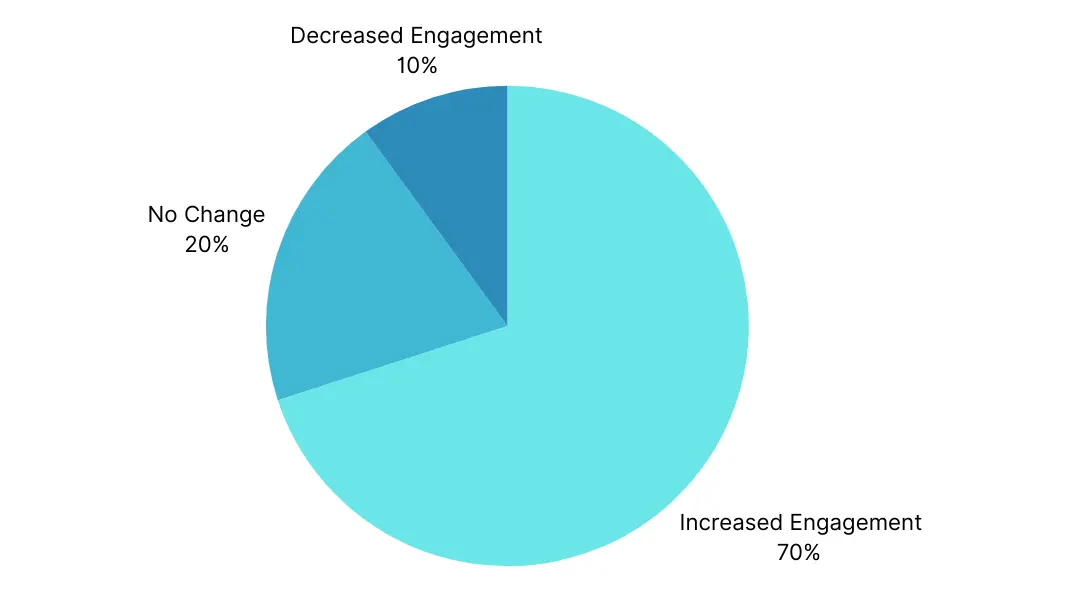
The data strongly supports the effectiveness of push notifications in boosting user engagement, a feature primarily and most effectively leveraged by mobile application platforms. This capability profoundly influences the mobile application description of successful interactive services.
The Core Distinction: What is a Web App vs. Mobile App?
Before delving into the pros, cons, and costs, let’s clearly define a web application and what a mobile app is. Understanding the fundamental difference between a website and a web application is crucial, as is differentiating true mobile application software from mobile-optimized websites.
What is a Web App?
A web application (web app) is essentially a software program that runs on a web server and is accessed by users through a web browser over the internet. Unlike traditional desktop software that you download and install, a web app requires no installation and is accessible from any device with an internet connection and a browser. Think of tools like Google Docs, Salesforce, or Figma – you simply open your browser, type the URL, and you're in. This ubiquity is a huge advantage. They are not to be confused with a static website, which primarily displays information. A web application defines interactive functionality, user input, and data processing. Users are constantly interacting with the application through their browsers, whether on desktop, tablet, or mobile. The concept of a web app means an interactive service delivered via a browser.
Real Examples:
- Netflix (web version): While they have a strong mobile app, their web app is a prime example of rich media delivery and user interaction through a browser.
- Slack (web app): A highly interactive communication platform, accessible directly through Chrome, Firefox, etc., without requiring a download.
- Canva: A graphic design tool used extensively for marketing and personal projects, accessible entirely via its web application.
What is a Mobile App?
A mobile application (mobile app) is a software program specifically designed to run on a smartphone or tablet device. These apps are downloaded and installed directly onto the device from app stores (like Apple's App Store or Google Play Store). Native mobile apps are built specifically for a particular operating system (iOS or Android) using specific programming languages (e.g., Swift/Objective-C for iOS, Kotlin/Java for Android). This allows them to take full advantage of device-specific features like the camera, GPS, accelerometer, contacts, and push notifications. When we ask what a mobile application is, we're referring to this dedicated, often high-performance, and deeply integrated software experience. The mobile application description emphasizes its device-centric nature. The mobile application means a piece of software that lives on your phone.
Real Examples:
- Uber: Relies heavily on device GPS and push notifications for real-time ride tracking.
- Instagram: Leverages the device camera, gallery, and notifications for its core social media experience.
- Starbucks App: Uses device location for store finding, and push notifications for promotions, along with mobile payment integration.
The fundamental difference between a web app and a website is interactivity, while the mobile application vs website difference lies in installation and device integration. The mobile web mobile app distinction is also crucial: a mobile web is just a website optimized for mobile browsers, whereas a mobile web app is still accessed via a browser but offers more app-like functionality without full native integration. This makes app vs mobile web a critical consideration.
The Weigh-In: Pros & Cons Table for Startups
Choosing between an app web app approach requires a clear understanding of the trade-offs. Here's a comparative look at the web application vs mobile application pros and cons for startups:
| Feature/Aspect | Mobile App (Native) | Web App (Responsive) |
|---|---|---|
| Performance | Generally faster, smoother, more responsive. | Dependent on browser and internet connection. Can be slower. |
| User Experience | Intuitive, immersive, adheres to OS guidelines. | Can be very good, but limited by browser environment. |
| Device Features | Full access (camera, GPS, accelerometer, contacts). | Limited access (e.g., location, but restricted). |
| Offline Access | Strong native support for offline functionality. | Limited or no offline access without specific tech (PWA). |
| Discoverability | App Stores (SEO for stores, paid ads). Highly competitive. | Search Engines (SEO). Easier initial discoverability. |
| Distribution | App Store approval processes (can be lengthy/strict). | Instant deployment via web server. No approvals. |
| Updates | Users must update manually via app stores. | Updates are instant and automatic for all users. |
| Development Cost | Higher (often separate codebases for iOS/Android). | Lower (single codebase for all platforms). |
| Development Time | Longer (two distinct builds, complex features). | Shorter (streamlined single codebase). |
| Maintenance | Higher (two codebases, OS updates, app store compliance). | Lower (single codebase, simpler updates). |
| User Engagement | Push notifications, icons on home screen foster re-engagement. | Relies on browser notifications, bookmarks. Lower re-engagement. |
| Monetization | In-app purchases, subscriptions, ads, freemium models. | Subscriptions, ads, premium features, e-commerce. |
| Platform Reach | Requires separate development for iOS and Android for full reach. | Universal reach across all devices/OS with a browser. |
| Security | Generally higher, as apps are sandboxed. | Dependent on browser security and web app implementation. |
This table clarifies the web vs app debate, highlighting that web based vs desktop application parallels the web vs. mobile app choice in terms of accessibility vs. deep integration. Mobile apps' web functionality is often a key consideration, where mobile web and mobile app capabilities merge.
Crunching the Numbers: Cost & Timeline Factors for Startups (2025 Insights)
For startups, the allocation of budget and estimation of time-to-market are critical strategic considerations. While exact figures are always project-specific, industry insights provide clear guidance on the relative investment and timelines associated with different app types.
Generally, mobile application development, especially for native apps requiring separate iOS and Android codebases, tends to involve a higher initial investment and longer development timelines compared to a responsive web application. The need for specialized developers per platform, rigorous testing, and app store submission processes contributes to this. Post-launch, maintaining two distinct native applications can also incur greater ongoing costs due to OS updates and feature enhancements for each platform.
In contrast, a web app typically offers a more cost-effective entry point and a significantly faster time-to-market. A single codebase can serve all devices, simplifying development and reducing maintenance overhead. Hybrid apps and PWAs often fall in the middle, offering a balance of cross-platform efficiency and the ability to leverage some native features, thereby optimizing resource allocation.
For startups, the decision between app versus website and the associated resource demands can be a make-or-break factor. A web app, meaning a potentially faster and more budget-friendly initial deployment, while a mobile application means a higher initial investment but a path to deeper, device-integrated user engagement. Understanding web vs app development from a resource perspective is crucial for sustainable growth.
Budget considerations can influence whether you choose mobile or web. See detailed costs in Mobile App Development Cost in USA (2025).
Navigating 2025: Key Trends Influencing Startup App Strategy
The digital landscape is never static. For startups in 2025, several key trends are blurring the lines between web application and mobile application and introducing new possibilities:
-
Progressive Web Apps (PWAs): The Best of Both Worlds?
- PWAs are web apps that deliver an app-like experience directly in a browser. They are discoverable via search engines, offer offline capabilities, can send push notifications, and can be "installed" to a user's home screen without an app store. Many see them as the answer to mobile web to app transitions, bridging the gap between mobile app vs mobile website. This is a significant trend for web and mobile app development. You can find more authoritative information on PWAs from Google Developers' Introduction to Progressive Web Apps.
- This indicates a strong upward trend as startups increasingly seek efficiency and broad accessibility, making PWAs a critical component of web and mobile strategies.
-
Hybrid Apps (React Native, Flutter): Cross-Platform Efficiency
- Hybrid app development allows developers to write code once and deploy it on both iOS and Android platforms, significantly reducing development time and cost compared to native development. Tools like React Native and Flutter are incredibly popular for web and mobile application development. This addresses the need for web and mobile presence without doubling the effort.
Projected Growth in Hybrid App Adoption by Startups (Mock Bar Chart Data Reflecting Industry Trends):
-
No-Code/Low-Code Platforms:
- These platforms (which Budventure specializes in!) are empowering startups to build functional web apps and even mobile apps with minimal or no coding. This dramatically reduces development time and cost, allowing founders to validate ideas quickly. This revolutionizes how startups define mobile application means or web app means in terms of accessibility.
-
AI Integration:
- The seamless integration of AI and machine learning is becoming standard, regardless of platform. Both web mobile app and native applications are leveraging AI for personalization, automation, and analytics.
-
Enhanced Security:
- As cyber threats evolve, web app security and mobile app security are paramount. Platforms are continually enhancing security protocols, but robust development practices remain critical for both. Is low code secure? Yes, when platforms follow best practices.
Projected Growth in PWA Adoption by Startups (Mock Bar Chart Data Reflecting Industry Trends):
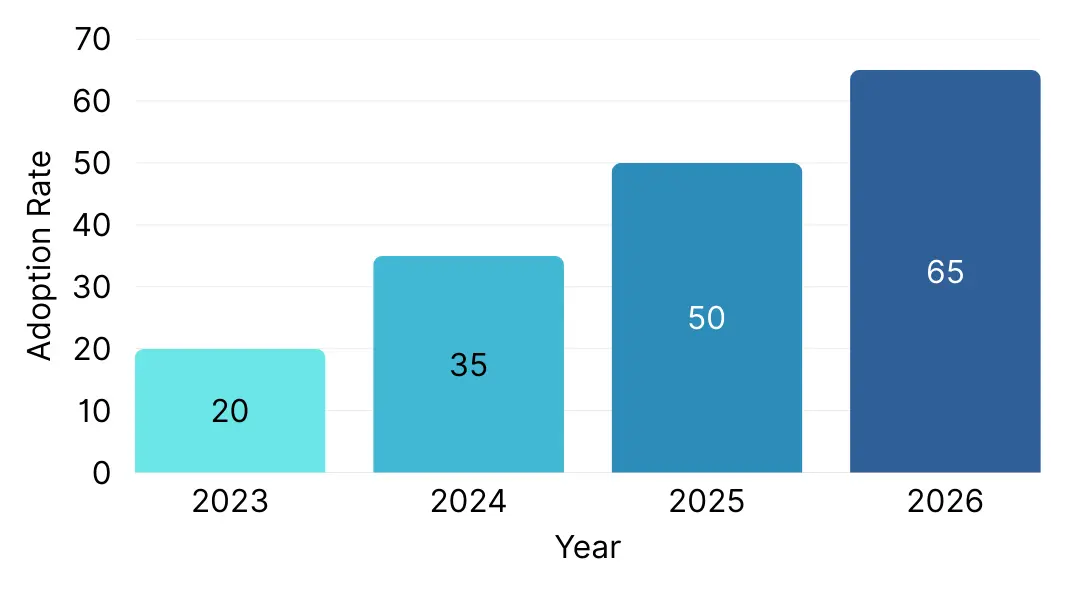
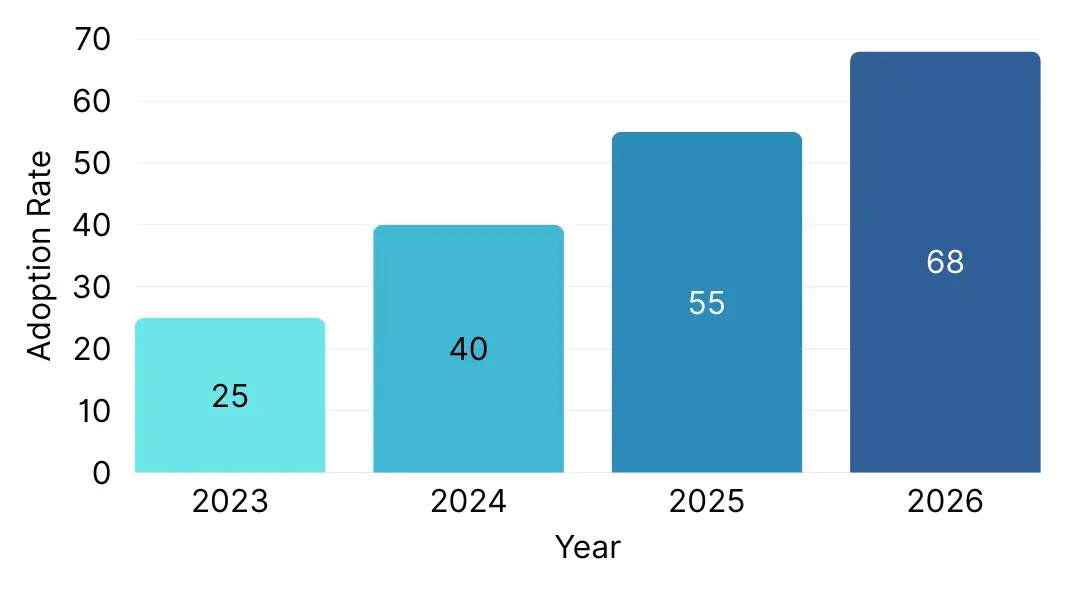
The increasing maturity of frameworks and the demand for cross-platform solutions are driving this significant rise in hybrid app development among startups.
These trends highlight that the web app vs mobile app debate is becoming less about a binary choice and more about a spectrum of solutions.
Expert Commentary: Budventure's Point of View
At Budventure, our perspective on the mobile app vs web app dilemma for startups in 2025 is clear: there's no one-size-fits-all answer. The optimal choice is always dictated by your unique business model, target audience, core features, and long-term vision.
We believe that data-driven decisions are paramount. Our analysis of industry insights illustrates a strong, but not overwhelming, lean towards native mobile apps, primarily for the unparalleled user experience and access to device features. However, the significant percentage opting for web-first or hybrid solutions underscores the undeniable value of speed, accessibility, and cost-efficiency, especially for early-stage startups focused on validating their market fit.
We often guide our clients through a phased approach. For many, starting with a robust, feature-rich web application as an MVP allows for faster market entry, iterative feedback, and lower initial investment. This app for web strategy minimizes risk. Once market validation is achieved and user behavior data is gathered, a strategic pivot to a complementary native mobile app development or a hybrid solution can be made. This ensures resources are invested wisely into a proven product.
Our expertise lies in helping you evaluate your specific needs. Do you need deep device integration (e.g., augmented reality, complex offline sync)? Then, a mobile application might be your answer. Is broad reach, rapid updates, and minimal friction for user access more important? A web app could be ideal. We're also seeing a growing demand for mobile web application development as a flexible middle ground.
We specialize in helping startups define what a web-based app is versus a native app for their unique use cases, and how to effectively develop a web application for mobile devices. Furthermore, we understand how do mobile apps work and how do mobile applications work, translating this technical knowledge into strategic guidance for your business.
When to Choose Which: A Checklist for Startups
To simplify your decision-making process, consider this checklist. Remember, your answers should be specific to your target audience and your core product offering.
Choose a Native Mobile App if:
- Deep Device Integration: Your core features heavily rely on camera, GPS, accelerometer, device storage, or other native hardware (mobile application means this level of integration).
- Offline Functionality is Critical: Users must be able to perform key tasks without an internet connection.
- Highly Immersive UX: Your app demands complex animations, high performance, or a user experience perfectly tailored to a specific OS.
- Push Notifications are Essential: You need to send real-time, highly engaging notifications directly to the user's device.
- Targeted App Store Discovery: You plan to leverage app store visibility and rankings as a primary acquisition channel.
- Complex Gestures/Interactions: Your app requires multi-touch gestures or complex interactions that are best supported natively.
- High Performance Gaming/Graphics: Your application is graphically intensive or requires very low latency.
Choose a Web App if:
- Broad Reach & Accessibility: You need to reach the widest possible audience across any device, OS, and browser without downloads or installations (web app or mobile app consideration leans here).
- Faster Time-to-Market: You need to launch quickly to validate your idea and gather user feedback.
- Lower Initial Development Cost: Your budget is constrained, and you need a more cost-effective entry point.
- Frequent Updates/Iterations: You anticipate frequent changes, new features, and require instant updates for all users.
- SEO is a Primary Acquisition Channel: You want your content and application to be discoverable through traditional search engines (applications of web context).
- No Device-Specific Features Required: Your core functionality doesn't depend on hardware like cameras, GPS, or offline access.
- Web in App Functionality is Sufficient: The user experience offered by a modern browser is adequate for your needs.
Consider a Hybrid App or PWA if:
- Cross-Platform Consistency is Key: You want a similar user experience across both iOS and Android without separate native development.
- Cost & Time Efficiency are High Priorities: You need to balance reach with budget and timeline constraints (web-based mobile application development often falls here).
- App-like Feel with Web Accessibility: You desire some native features (like push notifications, home screen icon) but value the universal reach of the web.
- Future Native App is a Possibility: You want a stepping stone to a full native app down the line.
The ultimate decision typically involves a blend, especially as mobile web apps evolve. The choice between web vs app server infrastructure will also hinge on your chosen path. Understanding the difference between an app and a website is key.
Conclusion: Crafting Your Path in 2025's Digital Landscape
The web application vs mobile application debate for startups in 2025 is more nuanced than ever. Our analysis of industry insights suggests a slight edge for native mobile apps when it comes to prioritizing ultimate user experience and device integration. However, the compelling advantages of web app accessibility, lower initial costs, and faster iteration, along with the rise of versatile hybrid and PWA technologies, mean that the web app vs mobile website decision is rarely straightforward.
For startups, strategic planning is paramount. Don't fall into the trap of simply following trends; instead, analyze your specific user needs, business goals, and available resources. Whether your goal is maximum device integration with mobile apps and web capabilities or universal accessibility, the technology exists to support your vision.
At Budventure, we stand ready to guide you through this critical choice. We bring expertise in web and mobile app development, helping you define what a mobile app is versus what a web app is for your unique business needs. We understand the difference between an app and a website from a strategic perspective, ensuring your investment yields maximum returns. From mobile web application development to full native builds, our team is equipped to turn your vision into a successful reality. We help you answer questions like how mobile applications work for your specific use cases, and ensure app vs application is clear in your strategy.
Make an informed decision that drives engagement, scales with your ambition, and positions your startup for success in the competitive market.


